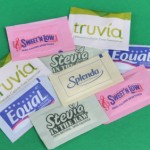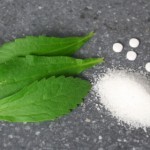Nearly a month ago I started to write a post on the "Fake sugars," I had read an article on them in the Personal Journal section of The Wall Street Journal, but got distracted when I realized I needed to think about (and write about) table sugar and high fructose corn syrup.
So now I'm finally going to start on the artificial sweeteners. There are four major ones that WSJ reviewed (they even had a panel of tasters): Sweet'N Low, Equal, Splenda and Truvia. They came on the market, respectively, in the 1970s, 1980s, 2000 and 2008. All have zero calories per packet, whereas table sugar has 15 or 16, depending on who you read, per teaspoon. They cost much more than sugar and are considerably sweeter. A Mayo Clinic article online reviews the general subject and terms these chemicals as intense sweeteners.
The National Cancer Institute mentions that they are regulated by the FDA and, in an August 2009 online paper, states there is "no clear evidence that the artificial sweeteners available commercially in the United States are associated with cancer risk in humans."
The most recent addition to this mix, called Truvia when it's made by Coca-Cola and Cargill, or PureVia when it's parents are PepsiCo and Merisant, comes from a plant called Stevia, found in South America. Stevia has a curious history in the United States; it was added to teas by Hain Celestial until the FDA got an anonymous letter questioning its safety in late 2007. At that point the FDA banned its use in foods, but in 2009, faced with major industry interest, Stevia by-products were approved as food additives (but not Stevia itself).
Now Truvia and PureVia are being used in a wide range of processed food and beverages. A cousin to the chemical they contain has been extensively used in Japan for over twenty years without major side effects being noted and Stevia, the parent plant, has not only been used for centuries in South America, but also touted for its supposed health benefits.
So why do I have some lingering doubts, in fact some major concerns about all of these chemical food additives, not excluding Truvia and PureVia?
As best I can tell the vast majority of the research on them has been sponsored by the same companies that profit from them. I fail to see independent, carefully performed, double-blind controlled studies especially on the "new two." Some research has been done on their chemical components, including one four-month study on type 2 diabetics that did not show either high blood pressure or high blood sugar as a result of consuming the active agent in Truvia.
But it's not just diabetics who are being exposed to the chemicals in these sweeteners. Most of us are, if we consume a diet drink or anything labeled "light." And medical history informs us that untoward effects may show up in relatively small number (or perhaps even large numbers), years later.
So I'm going to avoid "fake sugars" whenever I can. And perhaps, just perhaps, someday I'll find out I was being smart in doing so.



